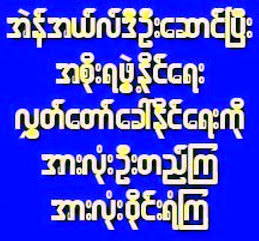| By WILLIAM BOOT | Friday, November 7, 2008 |
Swiss Firm Hired by Regime to Help Hydroelectric Projects
A Swiss engineering company on a human rights campaign’s “dirty list” for doing business in Burma has been commissioned again by the military regime to provide consulting services for more hydroelectric dam projects.
Colenco Power Engineering AG was hired by the Ministry of Electric Power-1, according to Burma's state media.
Colenco, based in the Swiss spa resort of Baden, has in the past provided technical services for several regime-promoted hydro systems, including the controversial huge planned at Tasang on the River Salween adjacent to Thailand.
Switzerland is not a member of the European Union and is thus not committed to support EU economic sanctions against the Burmese regime. But Colenco is on the “name-and-shame” list of 154 foreign firms operating in Burma compiled by the London-based human rights group Burma Campaign-UK.
The group separately identifies Colenco as being involved with the Yeywa Dam which it alleges has “caused forced displacements of local populations.”
On its Web site, Colenco lists eight countries where it operates, including Thailand, but makes no mention of Burma.
Human rights campaigners say this is a growing tactic of foreign firms doing business with a Burma military junta that is increasingly sanctioned by some Western governments in a bid to trigger regime change.
The US oil giant Chevron, which continues to do business in Burma despite pressure from the US Congress to withdraw, has recently dropped all references to its Burma operations, human rights groups say.
China is Now Burma’s Second-largest Trading Partner
China has climbed into second place among Burma’s chief trading partners, according to official figures just published.
Trade between the two countries grew by 60 percent in the 2007-8 financial year that ended in March, said the Ministry of Commerce, quoted by the official Chinese news agency Xinhua.
Previously, China ranked behind both Thailand and Singapore.
Now, only Thailand has more trade with Burma than China—mainly as a result of large gas purchases.
The value of Burma-China trade in the last full financial year was US $2.4 billion, compared with $1.5 billion in the previous year.
The latest figure represents almost 25 percent of Burma’s total annual foreign trade, said the ministry.
But there is a huge imbalance in the two-day trade, which is mostly in the form of imports from China of machinery, electric goods, processed food, and other consumer items.
Burma’s exports to China are mainly natural resources such as timber, gems, fish and farm produce.
However, the trade imbalance—which currently stands at $500 million—is expected to lessen in coming years when China begins importing large quantities of gas via pipeline from the Shwe offshore field in the Bay of Bengal.
Burma’s natural gas sales already account for more than 40 percent of total exports.
Lloyd’s Under Increasing Pressure to Halt Burma Business
Tens of thousands of emails and telephone calls have been bombarding key staff at Lloyd’s of London in the latest bid to get the international insurer to halt its business with the Burma military regime.
The messages and calls follow an attempt by the British government to also persuade Lloyd’s to give up its Burma business in line with Western economic sanctions against the regime.
The bombardment is being orchestrated by two international human rights groups, Burma Campaign-UK and the Avaaz group.
Avaaz was established in 2007 and has supporters not only on Britain, but also mainland Europe, the US, Australia and South America.
Lloyd’s remains tightlipped about its Burma business but its member syndicates are believed to provide the vital insurance that keeps important junta businesses afloat.
Burma Campaign-UK’s Johnny Chatterton said the current campaign hoped to also persuade ordinary employees of Lloyd’s to question their bosses over the Burma links.



















